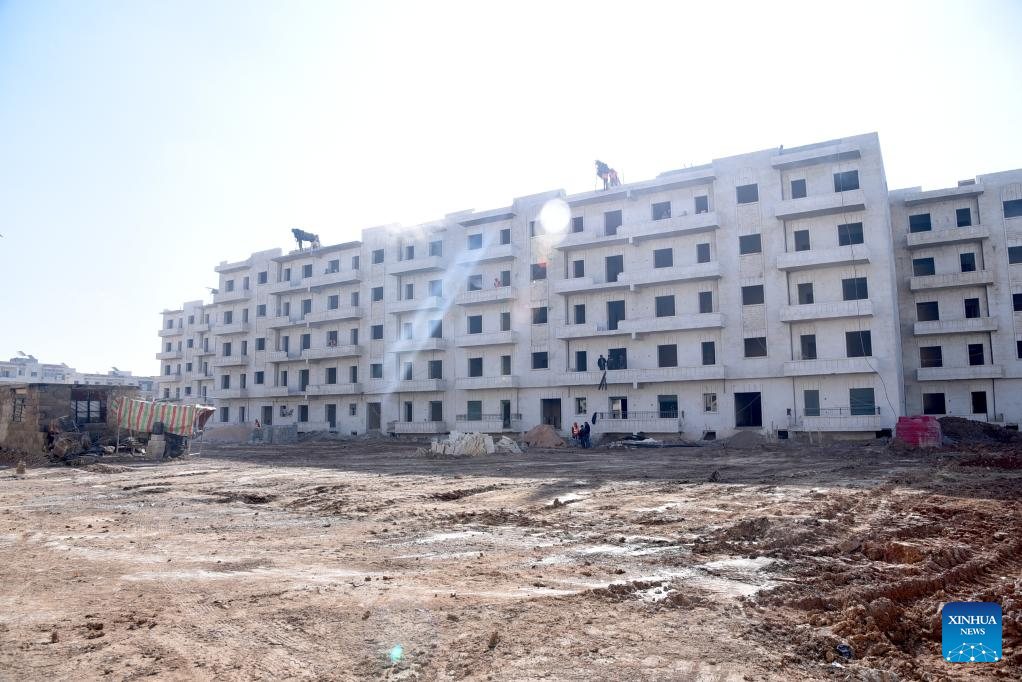
This photo taken on Jan. 24, 2024 shows residential buildings being prepared for the earthquake victims in Aleppo city, northern Syria. (Photo by Monsef Memari/Xinhua)
ALEPPO, Feb. 5 (Xinhua) -- One year after the deadly earthquakes that hit both Syria and Türkiye on Feb. 6, 2023, Syrian survivors share their stories, demonstrating an indomitable spirit in spite of their hellish experience and the difficulties in life.
Yahia Kaakeh, a 50-year-old painter and avid biker, was at his home in the Syrian city of Aleppo when the earthquakes struck. He was buried under the rubble for 40 hours before he was saved.
Kaakeh later learned that he was one of the two survivors in his apartment building, the collapse of which claimed the lives of 48 people. However, he could no longer move his legs after the disaster, a shocking truth for someone who like to exercise and had crossed borders on a bicycle to promote peace.
Even so, the man, who is still reliant on crutches and hasn't fully recovered from the injury sustained from the earthquakes, has shown an unwavering commitment to fighting for his full recovery and rebuilding his life and home, which was completely destroyed. He said that there was no going back and that he could not give up.
"My wish and ambition is that we, the Syrian people, can rebuild after the earthquakes and tough wars that destroyed, shattered, and broke us. Syria is standing and will be rebuilt," he said.
The collapse of Kaakeh's building, which was located in the Masharqa neighborhood, an area that had been on the front line of the civil war that ended in Aleppo in 2016, caused significant damage to another building nearby, leaving Yahia Majawaz, a 32-year-old father of four and a furniture painter, homeless.
As the home of Majawaz needs to be repaired after the quakes, he and his family sought refuge at a relative's house in a different part of Aleppo for seven months.
After he used borrowed money to repair his home, Majawaz returned to his home. Upon his homecoming, he still feels sad whenever he takes a look at the collapsed building next door, as it reminds him of his neighbors and the time they spent together.
He said the difficult time he spent with his family during the earthquake will forever be etched on his memory.
"This event will remain engraved in my memory because we faced extreme difficulty. When we see the demolished buildings, we feel sad and mourn for the dead."
Majawaz found the earthquake to be even more distressing than the Syrian civil war. "Even though we lived on the front line during the war, we didn't leave our home, but during the earthquakes, we had to."
The massive earthquakes last year killed about 44,000 people in Türkiye and about 6,000 others in Syria. Most of the Syrians who died were in rebel-held northwestern part of the country. The hardships experienced by Syrian quake survivors have added significantly to the burden they had after years of war. Nature's onslaught, which brought further destruction, displacement, and poverty, was the last thing they anticipated after enduring a prolonged conflict.
According to official statistics, 54 buildings were destroyed in Aleppo during the earthquakes. The United Nations High Commissioner for Refugees (UNHCR) said the earthquakes left 5.3 million people in Syria homeless.
Abdelkader Duwailibi, a member of the Executive Office of the Aleppo Governorate Council and the head of the earthquake response team, said local authorities had exerted great efforts to respond to the earthquakes during the past year.
He said the first stage involved rescuing survivors, removing debris, and providing shelter, and local authorities also focuses on providing alternative housing and rebuilding damaged buildings, during which financial support was offered to local residents for the reconstruction.
Salem Habeib, the Aleppo branch director of the government-run General Housing Foundation who is responsible for two projects that involve the reconstruction of 440 housing units in the areas of Haidariya and Maasaraniya, said the projects were successful despite challenges that include Western sanctions impeding the import of raw materials.
"The sanctions are affecting us greatly as 80 percent of the buildings' raw materials are imported. However, we worked day and night to finish the project in time," he said. ■

Yahia Majawaz, a 32-year-old father of four and a furniture painter, poses with his family and neighbors at his fixed house in Aleppo city, northern Syria, Jan. 25, 2024. (Photo by Monsef Memari/Xinhua)

Yahia Kaakeh, a 50-year-old painter and avid biker, stands next to a hole where his apartment building once stood before its collapse during the earthquakes in Aleppo city, northern Syria, Jan. 26, 2024. (Photo by Monsef Memari/Xinhua)



